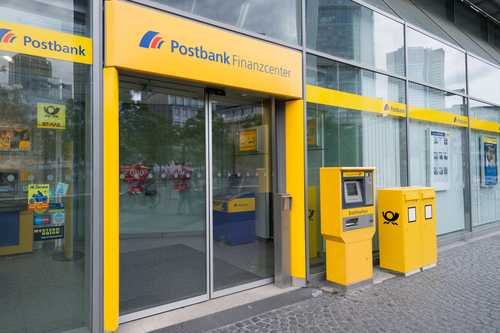L’Allemagne passe un cap
En Allemagne, une banque a passé un nouveau cap en décidant de facturer les dépôts des comptes courants à partir d’un montant de 50 000 euros et des comptes de dépôts à vue dès 25 000 euros. Postbank, la première banque de détail allemande avec plus de 12 millions de clients, souhaite ainsi les dissuader de laisser dormir trop d’argent chez elle.
Par conséquent, toute ouverture de compte courant après le 21 juin au sein de la banque donnera lieu à l’application de « frais de garde » à hauteur de 0,5 %, un taux qui s’applique également aux nouveaux comptes de dépôts à vue.
Pour les comptes existants, la mesure ne s’applique qu’à partir de 100 000 euros déposés. « Nous gardons un œil sur l’évolution du marché et nous déciderons de nouvelles mesures en temps voulu », précise un porte-parole de Deutsche Bank, maison mère de Postbank, au journal Ls Echos.
Alors que la majorité des établissements bancaires allemands n’envisageaient pas de taxer les dépôts des particuliers en deçà de 100 000 euros, la donne pourrait progressivement changer. Commerzbank a par exemple annoncé qu’elle imposerait des frais de garde à ses clients dès le mois d’août.
Les deux acteurs espèrent inciter leurs clients à se tourner vers des placements plus rémunérateurs. La hausse de l’inflation outre-Rhin, à 2,5 % en mai pourrait jouer en leur faveur. Reste à savoir si les épargnants ne préfèreront pas choisir une autre alternative : retirer leurs avoirs et les garder en liquidité provoquant alors un « bank run ».
Taxation des dépôts : une menace qui plane depuis plusieurs mois
La menace d’une taxation des dépôts n’est pas nouvelle. En France, quelques banques privées l’ont déjà mise à exécution pour leurs clients dont les avoirs dépassent le million d’euros. Plus récemment, la banque mobile N26, qui compte près de 1,6 million d’utilisateurs sur le territoire français, a annoncé qu’elle taxerait désormais les dépôts de ses nouveaux clients dès lors qu’ils sont supérieurs à 50 000 euros, avec une pénalité à 0,5 %. Cette mesure devrait lui permettre de financer ses nouveaux services, mais aussi de compenser le coût du taux négatif de 0,5 % appliqué par la Banque centrale européenne (BCE) qui vise à dissuader les banques de laisser une partie de leur trésorerie à son guichet.
La taxation des dépôts se généralise aussi à l’étranger, notamment en Allemagne, en Suisse, en Belgique et au Danemark. En effet, comme la BCE, la banque centrale danoise applique des taux négatifs ce qui incite certaines banques à les répercuter sur les dépôts supérieurs à 30 000 euros.
